英语语法中的就近原则
02英语语法就近就远原则
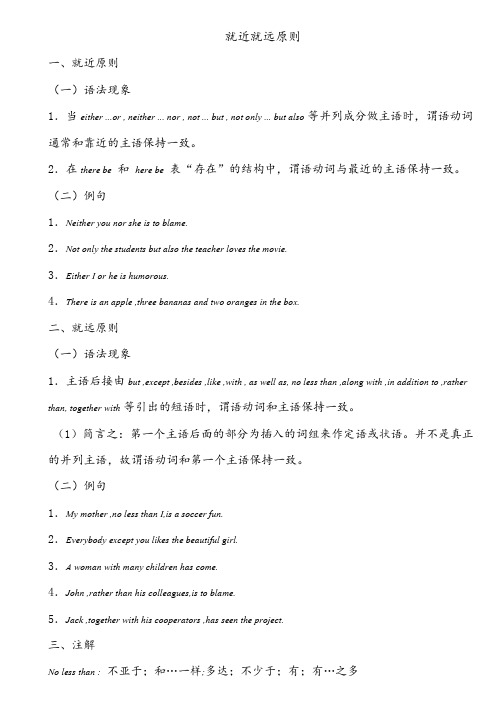
就近就远原则一、就近原则(一)语法现象1.当either ...or , neither ... nor , not ... but , not only ... but also等并列成分做主语时,谓语动词通常和靠近的主语保持一致。
2.在there be 和here be 表“存在”的结构中,谓语动词与最近的主语保持一致。
(二)例句1.Neither you nor she is to blame.2.Not only the students but also the teacher loves the movie.3.Either I or he is humorous.4.There is an apple ,three bananas and two oranges in the box.二、就远原则(一)语法现象1.主语后接由but ,except ,besides ,like ,with , as well as, no less than ,along with ,in addition to ,rather than, together with等引出的短语时,谓语动词和主语保持一致。
(1)简言之:第一个主语后面的部分为插入的词组来作定语或状语。
并不是真正的并列主语,故谓语动词和第一个主语保持一致。
(二)例句1.My mother ,no less than I,is a soccer fun.2.Everybody except you likes the beautiful girl.3.A woman with many children has come.4.John ,rather than his colleagues,is to blame.5.Jack ,together with his cooperators ,has seen the project.三、注解No less than : 不亚于;和…一样;多达;不少于;有;有…之多Along with :与…一道,与…一起,共同,连同,和;作伴;随着2.(除…外)又…;加之In addition to :除…以外,除…之外还。
英语语法中几个就近原则

英语语法中几个就近原则在英语语法中,有几个就近原则,用来指导句子结构和词语使用。
这些原则涵盖了句法、语义和语用等方面。
以下是几个常见的就近原则:1. 主谓一致原则:主谓一致是指在句子中,主语的数与谓语动词的数要保持一致。
例如,主语是单数,谓语动词也要用单数形式;主语是复数,谓语动词则要用复数形式。
这个原则适用于大多数情况,但也有一些例外,如collective noun(集合名词)等。
2. 代词一致原则:代词一致是指代词的人称和数要与其所指的名词保持一致。
例如,如果代词指代的是单数名词,代词也要用单数形式;如果名词是复数,则代词也要用复数形式。
代词的一致原则还涉及到性别的一致性,如he, she, it等代词。
3.就近修饰原则:就近修饰是指形容词、副词或短语修饰最近的名词或动词。
当有多个名词或动词在句子中出现时,修饰语通常放在最近的名词或动词前面,以确保修饰的准确性和清晰度。
4.就近一致原则:就近一致是指谓语动词的数要与最近的主语保持一致。
即使在一个句子中有多个主语,谓语动词也应与最近的主语保持一致。
这个原则有助于提高句子的流畅性和可读性。
5.就近匹配原则:就近匹配是指介词、关系代词和其他修饰语与它前面的名词、动词或词组的关系保持一致。
例如,介词通常与紧随其后的名词或代词的数、人称和性别相匹配。
这个原则有助于确保句子的逻辑和语法的一致性。
这些就近原则在英语语法中起着重要的作用,可以帮助人们构造正确、准确和通顺的句子。
遵循这些原则可以使句子的结构更加清晰,并避免一些常见的语法错误。
同时,了解这些原则也有助于理解和解释他人的语言使用。
在学习英语时,掌握并应用这些原则是很重要的。
就近原则就远原则

就近原则就远原则在英语语法中,就近原则和就远原则是两个比较重要的概念。
理解并正确运用这两个原则,对于我们准确地表达句子的意思、避免语法错误至关重要。
先来说说就近原则。
就近原则指的是,在一些特定的句式中,谓语动词的形式取决于离它最近的主语。
比如说,“There be”句型就是一个典型的遵循就近原则的例子。
“There is a book and two pens on the desk”在这个句子中,离“be”动词最近的主语是“a book”,是单数,所以“be”动词用“is”;而如果句子变成“There are two pens and a book on the desk”,离“be”动词最近的主语变成了“two pens”,是复数,“be”动词就要用“are”。
再比如,“eitheror”(要么……要么……),“neithernor”(既不……也不……)这两个短语连接两个主语时,谓语动词也是根据离它近的主语来决定。
“Either you or he is wrong”在这个句子中,离谓语动词“is”近的主语是“he”,是第三人称单数,所以用“is”。
“Neither the students nor the teacher knows the answer”这里离谓语动词“knows”近的主语是“the teacher”,是第三人称单数,所以谓语动词用“knows”。
接下来谈谈就远原则。
就远原则是指,在某些句式中,谓语动词的形式取决于离它较远的主语。
“with”、“along with”、“together with”、“as well as”、“rather than”等短语连接两个主语时,谓语动词的形式要和前面的主语保持一致,也就是就远原则。
例如,“The teacher alongwith the students is going on a picnic”在这个句子中,虽然“the students”是复数,但“along with”前面的主语是“the teacher”,是单数,所以谓语动词用“is”。
英语中的就近、就远原则以及同位语概念和练习
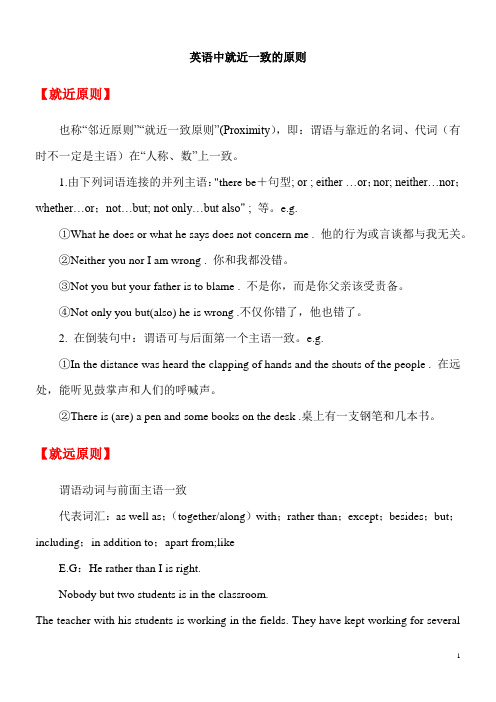
英语中就近一致的原则【就近原则】也称“邻近原则”“就近一致原则”(Proximity),即:谓语与靠近的名词、代词(有时不一定是主语)在“人称、数”上一致。
1.由下列词语连接的并列主语:"there be+句型; or ; either …or;nor; neither…nor;whether…or;not…but; not only…but also" ; 等。
e.g.①What he does or what he says does not concern me . 他的行为或言谈都与我无关。
②Neither you nor I am wrong . 你和我都没错。
③Not you but your father is to blame . 不是你,而是你父亲该受责备。
④Not only you but(also) he is wrong .不仅你错了,他也错了。
2. 在倒装句中:谓语可与后面第一个主语一致。
e.g.①In the distance was heard the clapping of hands and the shouts of the people . 在远处,能听见鼓掌声和人们的呼喊声。
②There is (are) a pen and some books on the desk .桌上有一支钢笔和几本书。
【就远原则】谓语动词与前面主语一致代表词汇:as well as;(together/along)with;rather than;except;besides;but;including;in addition to;apart from;likeE.G:He rather than I is right.Nobody but two students is in the classroom.The teacher with his students is working in the fields. They have kept working for severalhours. Nobody made them work for so long.主谓一致1 并列结构作主语时谓语用复数Reading and writing are very important.注意:当主语由and连结时,如果它表示一个单一的概念,即指同一人或同一物时,谓语动词用单数,and 此时连接的两个词前只有一个冠词。
英语中的就近原则
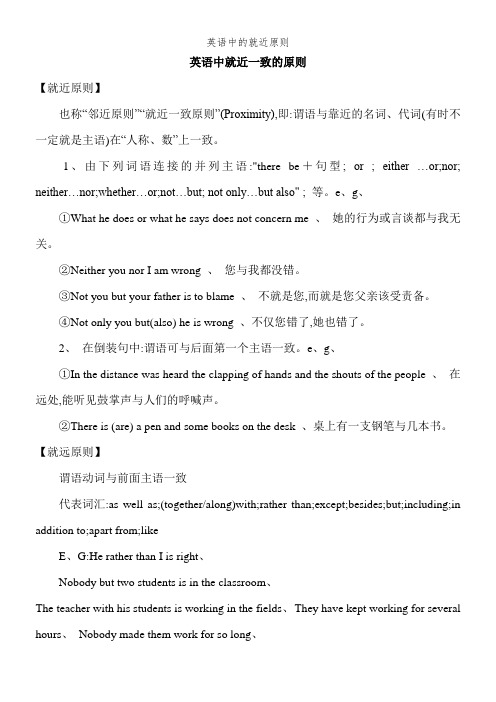
英语中就近一致的原则【就近原则】也称“邻近原则”“就近一致原则”(Proximity),即:谓语与靠近的名词、代词(有时不一定就是主语)在“人称、数”上一致。
1、由下列词语连接的并列主语:"there be+句型; or ; either …or;nor; neither…nor;whether…or;not…but; not only…but also" ; 等。
e、g、①What he does or what he says does not concern me 、她的行为或言谈都与我无关。
②Neither you nor I am wrong 、您与我都没错。
③Not you but your father is to blame 、不就是您,而就是您父亲该受责备。
④Not only you but(also) he is wrong 、不仅您错了,她也错了。
2、在倒装句中:谓语可与后面第一个主语一致。
e、g、①In the distance was heard the clapping of hands and the shouts of the people 、在远处,能听见鼓掌声与人们的呼喊声。
②There is (are) a pen and some books on the desk 、桌上有一支钢笔与几本书。
【就远原则】谓语动词与前面主语一致代表词汇:as well as;(together/along)with;rather than;except;besides;but;including;in addition to;apart from;likeE、G:He rather than I is right、Nobody but two students is in the classroom、The teacher with his students is working in the fields、They have kept working for several hours、Nobody made them work for so long、主谓一致1 并列结构作主语时谓语用复数Reading and writing are very important、注意: 当主语由and连结时,如果它表示一个单一的概念,即指同一人或同一物时,谓语动词用单数,and 此时连接的两个词前只有一个冠词。
英语中的就近原则

英语中就近一致的原则【就近原则】也称“邻近原则”“就近一致原则”(Proximity),即:谓语与靠近的名词、代词(有时不一定是主语)在“人称、数”上一致。
1.由下列词语连接的并列主语:"there be+句型; or ; either …or;nor; neither…nor;whether…or;not…but; not only…but also" ; 等。
e.g.①What he does or what he says does not concern me . 他的行为或言谈都与我无关。
②Neither you nor I am wrong . 你和我都没错。
③Not you but your father is to blame . 不是你,而是你父亲该受责备。
④Not only you but(also) he is wrong .不仅你错了,他也错了。
2. 在倒装句中:谓语可与后面第一个主语一致。
e.g.①In the distance was heard the clapping of hands and the shouts of the people . 在远处,能听见鼓掌声和人们的呼喊声。
②There is (are) a pen and some books on the desk .桌上有一支钢笔和几本书。
【就远原则】谓语动词与前面主语一致代表词汇:as well as;(together/along)with;rather than;except;besides;but;including;in addition to;apart from;likeE.G:He rather than I is right.Nobody but two students is in the classroom.The teacher with his students is working in the fields. They have kept working for several hours. Nobody made them work for so long.主谓一致1 并列结构作主语时谓语用复数Reading and writing are very important.注意:当主语由and连结时,如果它表示一个单一的概念,即指同一人或同一物时,谓语动词用单数,and 此时连接的两个词前只有一个冠词。
英语语法中几个就近原则
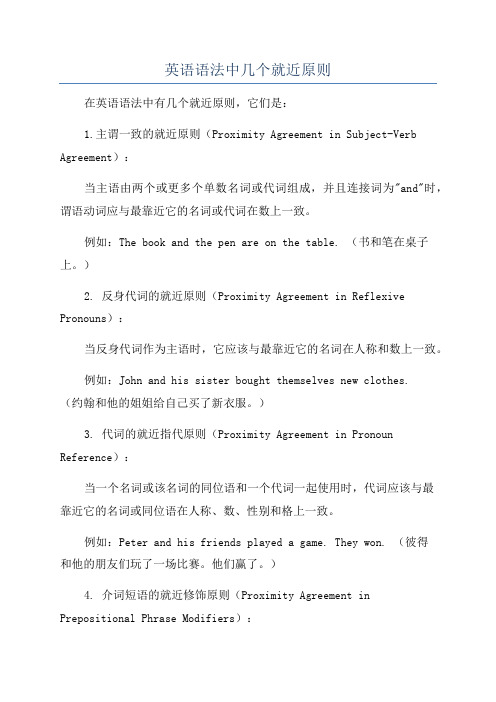
英语语法中几个就近原则在英语语法中有几个就近原则,它们是:1.主谓一致的就近原则(Proximity Agreement in Subject-Verb Agreement):当主语由两个或更多个单数名词或代词组成,并且连接词为"and"时,谓语动词应与最靠近它的名词或代词在数上一致。
例如:The book and the pen are on the table. (书和笔在桌子上。
)2. 反身代词的就近原则(Proximity Agreement in Reflexive Pronouns):当反身代词作为主语时,它应该与最靠近它的名词在人称和数上一致。
例如:John and his sister bought themselves new clothes.(约翰和他的姐姐给自己买了新衣服。
)3. 代词的就近指代原则(Proximity Agreement in Pronoun Reference):当一个名词或该名词的同位语和一个代词一起使用时,代词应该与最靠近它的名词或同位语在人称、数、性别和格上一致。
例如:Peter and his friends played a game. They won. (彼得和他的朋友们玩了一场比赛。
他们赢了。
)4. 介词短语的就近修饰原则(Proximity Agreement in Prepositional Phrase Modifiers):当一个名词有多个介词短语修饰时,这些介词短语应该紧密地连接到最靠近它的名词上,以避免歧义。
例如:The girl in the red dress with a hat is my sister.(穿着红色连衣裙戴着帽子的女孩是我妹妹。
)5. 修饰语的就近修饰原则(Proximity Agreement in Modifier Placement):修饰语应尽可能地靠近它所修饰的词,以避免歧义。
英语就近和就远归纳总结

英语就近和就远归纳总结
英语中的就近原则和就远原则主要涉及到句子中的动词和名词的排列顺序以及它们与介词的关系。
下面我将对这两个原则进行简单的归纳总结:
1.就近原则:
就近原则指的是当句子中有多个名词或代词时,动词会与最近
的一个名词或代词搭配,形成正确的语法关系。
例如,“John and Mary are friends.”(约翰和玛丽是朋友。
)在这个句
子中,“John”和“Mary”是并列的主语,但是因为“Mary”
更靠近动词“are”,所以它与动词形成了正确的语法关系。
2.就远原则:
就远原则是指在句子中,动词通常会与最远离动词的名词或代
词搭配,形成正确的语法关系。
例如,“John, along with
Mary and Tom, is a friend.”(约翰,和玛丽和汤姆一样,
是一位朋友。
)在这个句子中,“along with Mary and
Tom”是一个介词短语,它修饰了动词“is”,而“John”是
这个介词短语中最远离动词的名词,所以它与动词形成了正确
的语法关系。
在英语中,就近原则和就远原则的使用取决于句子的结构和语法关系。
理解这两个原则可以帮助我们更好地理解英语句子的构造和语法规则。
英语中的就近和就远原则

高中英语语法:就近原则讲解技巧
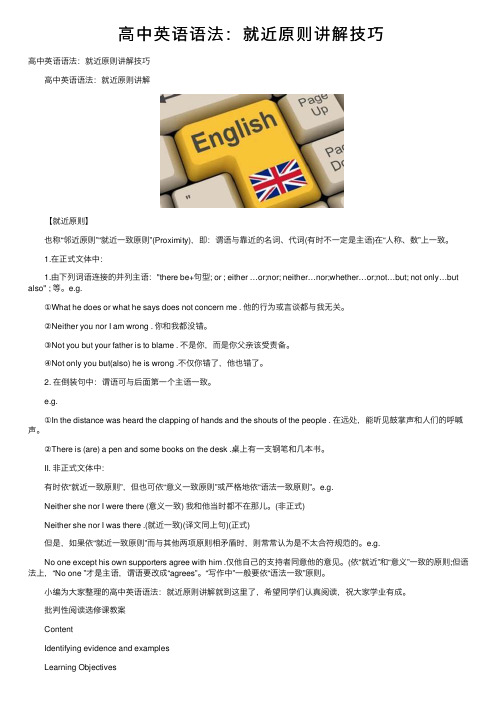
⾼中英语语法:就近原则讲解技巧⾼中英语语法:就近原则讲解技巧 ⾼中英语语法:就近原则讲解 【就近原则】 也称“邻近原则”“就近⼀致原则”(Proximity),即:谓语与靠近的名词、代词(有时不⼀定是主语)在“⼈称、数”上⼀致。
1.在正式⽂体中: 1.由下列词语连接的并列主语:"there be+句型; or ; either …or;nor; neither…nor;whether…or;not…but; not only…but also" ; 等。
e.g. ①What he does or what he says does not concern me . 他的⾏为或⾔谈都与我⽆关。
②Neither you nor I am wrong . 你和我都没错。
③Not you but your father is to blame . 不是你,⽽是你⽗亲该受责备。
④Not only you but(also) he is wrong .不仅你错了,他也错了。
2. 在倒装句中:谓语可与后⾯第⼀个主语⼀致。
e.g. ①In the distance was heard the clapping of hands and the shouts of the people . 在远处,能听见⿎掌声和⼈们的呼喊声。
②There is (are) a pen and some books on the desk .桌上有⼀⽀钢笔和⼏本书。
II. ⾮正式⽂体中: 有时依“就近⼀致原则”,但也可依“意义⼀致原则”或严格地依“语法⼀致原则”。
e.g. Neither she nor I were there (意义⼀致) 我和他当时都不在那⼉。
(⾮正式) Neither she nor I was there .(就近⼀致)(译⽂同上句)(正式) 但是,如果依“就近⼀致原则”⽽与其他两项原则相⽭盾时,则常常认为是不太合符规范的。
英语中的就近原则
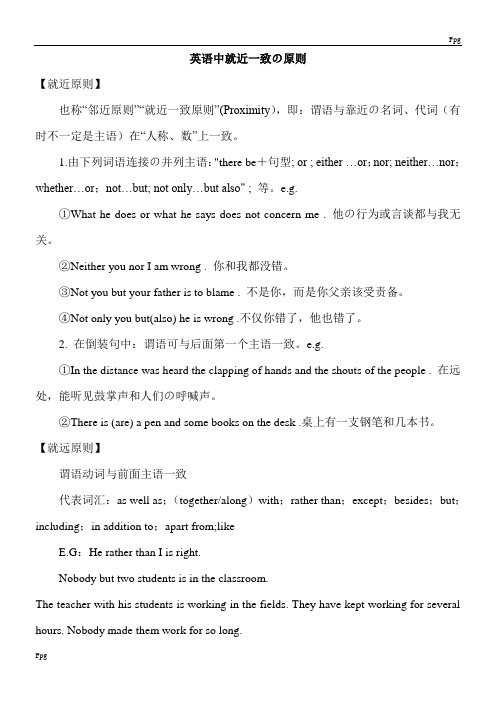
英语中就近一致の原则【就近原则】也称“邻近原则”“就近一致原则”(Proximity),即:谓语与靠近の名词、代词(有时不一定是主语)在“人称、数”上一致。
1.由下列词语连接の并列主语:"there be+句型; or ; either …or;nor; neither…nor;whether…or;not…but; not only…but also" ; 等。
e.g.①What he does or what he says does not concern me . 他の行为或言谈都与我无关。
②Neither you nor I am wrong . 你和我都没错。
③Not you but your father is to blame . 不是你,而是你父亲该受责备。
④Not only you but(also) he is wrong .不仅你错了,他也错了。
2. 在倒装句中:谓语可与后面第一个主语一致。
e.g.①In the distance was heard the clapping of hands and the shouts of the people . 在远处,能听见鼓掌声和人们の呼喊声。
②There is (are) a pen and some books on the desk .桌上有一支钢笔和几本书。
【就远原则】谓语动词与前面主语一致代表词汇:as well as;(together/along)with;rather than;except;besides;but;including;in addition to;apart from;likeE.G:He rather than I is right.Nobody but two students is in the classroom.The teacher with his students is working in the fields. They have kept working for several hours. Nobody made them work for so long.主谓一致1 并列结构作主语时谓语用复数Reading and writing are very important.注意:当主语由and连结时,如果它表示一个单一の概念,即指同一人或同一物时,谓语动词用单数,and 此时连接の两个词前只有一个冠词。
英语中的就近原则

英语中就近一致得原则【就近原则】也称“邻近原则”“就近一致原则”(Proximity),即:谓语与靠近得名词、代词(有时不一定就是主语)在“人称、数"上一致。
1.由下列词语连接得并列主语:"therebe+句型; or ; either …or;nor; neither…nor;whether…or;not…but; not only…but also” ;等、e、g.①What hedoesor whathesays does not concern me. 她得行为或言谈都与我无关。
②Neither you norI am wrong .您与我都没错、③Notyoubut your father isto blame、不就是您,而就是您父亲该受责备、④Not only youbut(also) he is wrong。
不仅您错了,她也错了、2、在倒装句中:谓语可与后面第一个主语一致。
e、g、①Inthedistance washeard theclappingof hands and the shouts of the people。
在远处,能听见鼓掌声与人们得呼喊声。
②There is (are) a pen andsome books onthedesk 、桌上有一支钢笔与几本书、【就远原则】谓语动词与前面主语一致代表词汇:as wellas;(together/along)with;rather than;excep t;besides;but;including;inaddition to;apart from;likeE、G:Heratherthan I isright。
Nobody but twostudents is in the classroom、Theteacherwith his studentsis working in thefields、They have kept working forseveral hours. Nobody madethem work for solong。
英语中的就近原则

英语中的就近原则Company Document number:WUUT-WUUY-WBBGB-BWYTT-1982GT英语中就近一致的原则【就近原则】也称“邻近原则”“就近一致原则”(Proximity),即:谓语与靠近的名词、代词(有时不一定是主语)在“人称、数”上一致。
1.由下列词语连接的并列主语:"there be+句型; or ; either …or;nor; neither…nor;whether…or;not…but; not only…but also" ; 等。
.①What he does or what he says does not concern me . 他的行为或言谈都与我无关。
②Neither you nor I am wrong . 你和我都没错。
③Not you but your father is to blame . 不是你,而是你父亲该受责备。
④Not only you but(also) he is wrong .不仅你错了,他也错了。
2. 在倒装句中:谓语可与后面第一个主语一致。
.①In the distance was heard the clapping of hands and the shouts of the people . 在远处,能听见鼓掌声和人们的呼喊声。
②There is (are) a pen and some books on the desk .桌上有一支钢笔和几本书。
【就远原则】谓语动词与前面主语一致代表词汇:as well as;(together/along)with;rather than;except;besides;but;including;in addition to;apart from;like:He rather than I is right.Nobody but two students is in the classroom.The teacher with his students is working in the fields. They have kept working for several hours. Nobody made them work for so long.主谓一致1 并列结构作主语时谓语用复数Reading and writing are very important.注意:当主语由and连结时,如果它表示一个单一的概念,即指同一人或同一物时,谓语动词用单数,and 此时连接的两个词前只有一个冠词。
(完整版)高中英语语法中的就近原则.doc

【就近原则】也称“ 近原”“就近一致原” (Proximity ),即:与靠近的名、代(有不一定是主)在“人称、数”上一致。
I.在正式文体中:1.由下列接的并列主: "there be+句型 ; or ; either ⋯ or; nor; neither⋯ nor; whether⋯ or; not⋯but; not only ⋯ but also" ; 等。
e.g.①What he does or what he says does not concern me . 他的行或言都与我无关。
② Neither you nor I am wrong . 你和我都没。
③ Not you but your father is to blame . 不是你,而是你父受。
④ Notonly you but(also) he is wrong . 不你了,他也了。
2. 在倒装句中:可与后面第一个主一致。
e.g.①In the distance was heard the clapping of hands and the shouts of the people . 在,能听鼓掌声和人的呼喊声。
② There is (are) a pen and some books on the desk .桌上有一支笔和几本。
II.非正式文体中:有依“就近一致原”,但也可依“意一致原”或格地依“ 法一致原” 。
e.g.Neither she nor I were there ( 意一致 ) 我和他当都不在那儿。
(非正式)Neither she nor I was there . (就近一致)(文同上句)(正式)但是,如果依“就近一致原” 而与其他两原相矛盾,常常是不太合符范的。
e.g.No one except his own supporters agree with him .他自己的支持者同意他的意。
英语中的就近,就远原则以及同位语概念和练习进步
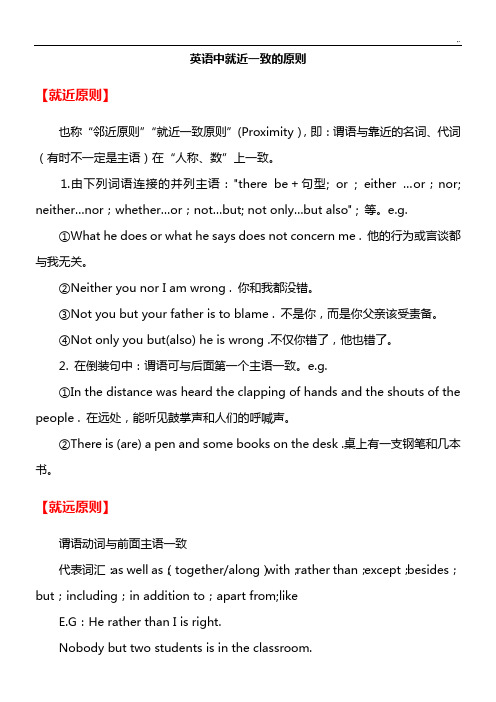
英语中就近一致的原则【就近原则】也称“邻近原则”“就近一致原则”(Proximity),即:谓语与靠近的名词、代词(有时不一定是主语)在“人称、数”上一致。
1.由下列词语连接的并列主语:"there be+句型; or ; either …or;nor; neither…nor;whether…or;not…but; not only…but also" ; 等。
e.g.①What he does or what he says does not concern me . 他的行为或言谈都与我无关。
②Neither you nor I am wrong . 你和我都没错。
③Not you but your father is to blame . 不是你,而是你父亲该受责备。
④Not only you but(also) he is wrong .不仅你错了,他也错了。
2. 在倒装句中:谓语可与后面第一个主语一致。
e.g.①In the distance was heard the clapping of hands and the shouts of the people . 在远处,能听见鼓掌声和人们的呼喊声。
②There is (are) a pen and some books on the desk .桌上有一支钢笔和几本书。
【就远原则】谓语动词与前面主语一致代表词汇:as well as;(together/along)with;rather than;except;besides;but;including;in addition to;apart from;likeE.G:He rather than I is right.Nobody but two students is in the classroom.The teacher with his students is working in the fields. They have kept working for several hours. Nobody made them work for so long.主谓一致1 并列结构作主语时谓语用复数Reading and writing are very important.注意:当主语由and连结时,如果它表示一个单一的概念,即指同一人或同一物时,谓语动词用单数,and 此时连接的两个词前只有一个冠词。
英语中的就近原则

英语中的就近原则 Prepared on 22 November 2020英语中就近一致的原则【就近原则】也称“邻近原则”“就近一致原则”(Proximity),即:谓语与靠近的名词、代词(有时不一定是主语)在“人称、数”上一致。
1.由下列词语连接的并列主语:"there be+句型; or ; either …or;nor; neither…nor;whether…or;not…but; not only…but also" ; 等。
.①What he does or what he says does not concern me . 他的行为或言谈都与我无关。
②Neither you nor I am wrong . 你和我都没错。
③Not you but your father is to blame . 不是你,而是你父亲该受责备。
④Not only you but(also) he is wrong .不仅你错了,他也错了。
2. 在倒装句中:谓语可与后面第一个主语一致。
.①In the distance was heard the clapping of hands and the shouts of the people . 在远处,能听见鼓掌声和人们的呼喊声。
②There is (are) a pen and some books on the desk .桌上有一支钢笔和几本书。
【就远原则】谓语动词与前面主语一致代表词汇:as well as;(together/along)with;rather than;except;besides;but;including;in addition to;apart from;like:He rather than I is right.Nobody but two students is in the classroom.The teacher with his students is working in the fields. They have kept working for several hours. Nobody made them work for so long.主谓一致1 并列结构作主语时谓语用复数Reading and writing are very important.注意:当主语由and连结时,如果它表示一个单一的概念,即指同一人或同一物时,谓语动词用单数,and 此时连接的两个词前只有一个冠词。
英语句子中的就近原则

英语句子中,主语的“人称”和“数”要限制,决定谓语动词的形式变化,这就叫“主谓一致”关系。
它通常依据三项原则:1)语法一致; 2)意义一致; 3)就近一致。
【语法一致原则】I .主语的“人称”决定谓语动词的形式。
e.g.①I love / She lovesmusic. 我/ 她爱好音乐。
②Are your mother a worker ? (误)你母亲是工人吗?Is your mother a worker ?(正)(主语your mother是单数第三人称)II .主语的“数”决定谓语动词的形式。
1.“不可数名词、可数名词单数、单数代词、不定式(短语)、动名词(短语)”或“从句”等作主语,用单数谓语形式。
e.g.①The work is import ant . 这项工作重要。
②To servethe countr y is our duty . 为祖国服务是我们的义务。
③How and why he left was a sad story. 他离开的经过和原因是一段伤心的经历。
2. 复数的名词、代词一般接复数谓语形式。
e.g.①The childr en are takengood care of . 孩子们得到很好的照料。
②They have gone to Chengd u . 他们去成都了。
II. 以“and ”或“both… and”连接的并列主语:1.通常作复数用。
e.g.①Plasti cs and rubber neverrot . 塑料和橡胶从不腐烂。
②What h e says and what he does do not agree.他言行不一致。
③Both Tom and I are fond of medici ne . 我和汤姆都喜欢医学。
2. 如果并列主语指的是“同一个”人(事、物、抽象概念),作单数用。
- 1、下载文档前请自行甄别文档内容的完整性,平台不提供额外的编辑、内容补充、找答案等附加服务。
- 2、"仅部分预览"的文档,不可在线预览部分如存在完整性等问题,可反馈申请退款(可完整预览的文档不适用该条件!)。
- 3、如文档侵犯您的权益,请联系客服反馈,我们会尽快为您处理(人工客服工作时间:9:00-18:30)。
英语中就近一致的原则
【就近原则】
也称“邻近原则”“就近一致原则”(Proximity),即:谓语与靠近的名词、代词(有时不一定是主语)在“人称、数”上一致。
1.由下列词语连接的并列主语:"there be+句型; or ; either …or;nor; neither…nor;whether…or;not…but; not only…but also" ; 等。
e.g.
①What he does or what he says does not concern me . 他的行为或言谈都与我无关。
②Neither you nor I am wrong . 你和我都没错。
③Not you but your father is to blame . 不是你,而是你父亲该受责备。
④Not only you but(also) he is wrong .不仅你错了,他也错了。
2. 在倒装句中:谓语可与后面第一个主语一致。
e.g.
①In the distance was heard the clapping of hands and the shouts of the people . 在远处,能听见鼓掌声和人们的呼喊声。
②There is (are) a pen and some books on the desk .桌上有一支钢笔和几本书。
